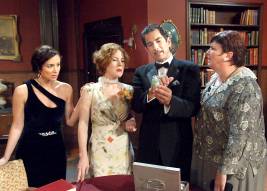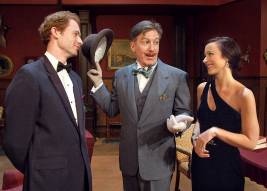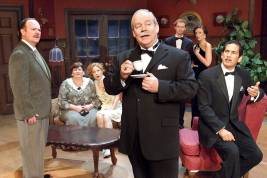
Agatha Christie and Hercule Poirot give Theatre 40 one of its best productions with the Queen Of Crime’s classic mystery thriller Black Coffee, one which delivers at least as many laughs as thrills, the entire cast delivering sparkling performances with just the right amount of tongue in cheek.
To the surprise of absolutely no one familiar with the Christie oeuvre, Black Coffee starts with a dozen or so characters, kills off one of them, and then challenges us to sniff out the murderer before her master sleuth beats us to it.
Here, the suspects are all guests of Sir Claud Armory (David Hunt Stafford), a renowned scientist who has come up with a formula for an atomic bomb capable of killing people, not by the thousands, but by the millions. (Prophetic indeed for a play written in 1930.) Sir Claud assembles family members and friends in the library and announces that one of them has stolen the formula from his safe. Reasoning that the thief must still have it in his or her possession, Sir Claud offers that person the opportunity to return it anonymously. He explains that one of the servants has been instructed to turn off all the lights in the library, allowing whoever stole the formula to return it anonymously in the ensuing darkness. The lights do indeed go off as planned, but when they come on again, the formula is still missing and someone who was alive before the blackout has met his or her maker in the interim. Since Sir Claud had only a few moments before commented on the bitter taste of the coffee he was drinking, it should come as no surprise that the murder victim is none other than …
Before long, Belgian sleuth Poirot (Tom Dugan) arrives, having previously been summoned by Sir Claud to help unravel the mystery of the missing formula. Naturally, he sticks around to solve a far more perplexing riddle—who among the guests put poison in Sir Claud’s coffee.
The suspects include Sir Claud’s son Richard (Corey Rieger), his beautiful half-Italian daughter-in-law Lucia (Shelby Kocee), his spinster sister Caroline Amory (LizAnne Keigley), his very modern niece Barbara (Katharine McEwan), his secretary Edward Raynor (Lary Ohlson), and a certain Dr. Carelli (Randy Vasquez), an Italian friend of Lucia’s. Completing the cast of characters are Poirot’s faithful sidekick Captain Arthur Hastings (Nicholas Hosking), Inspector Japp of Scotland Yard (Don Moss), Amory butler Teedwell and his doppelganger Constable Johnson (Tim Astor), local physician Dr. Graham (Christy Holy), and the family butler Treadwell (John McGuire).
Director (and obvious Christie fan) Bruce Gray understands the dry humor that faithful Dame Agatha readers have come to know and love, and the result is a production that generates more than a few laughs from its characters’ quirks and foibles.
Dugan’s performance stands up nicely against such illustrious film and TV Poirots as Albert Finney, Peter Ustinov, and David Suchet, capturing the Belgian detective’s eccentricities without ever overplaying them. Hosking is a delight as the ever eager but bumbling Hastings, and Moss makes for a fine Japp, whose skill as a detective cannot compare to that of his Belgian competitor.
Among the suspects, McEwan is delectably brash as Barbara, Kocee the picture of beauty and elegance as Lucia, and Rieger a nice blend of British gentleman and romantic leading man. Keigley has great fun with Miss Caroline’s considerable heft, and Vasquez has equal fun with Corelli’s Italian-ness. (Christie fans will chuckle at her characters’ unwavering distrust of anything foreign.) Astor does spiffy work as both servant and policeman, his being cast in both roles leading to one of the show’s biggest laughs, one not in the original script but perfectly in tune with the production’s slyly irreverent (though never disrespectful) tone. Holy, McGuire, and Stafford complete the cast in fine fashion.
Jeff G. Rack’s set is one of his most gorgeous and finely detailed, though prop mistress/dramaturg Jan Fischer could surely have found a decade-appropriate phone, and one without the even more anachronistic coiled phone cord. Dan Reed’s lighting is excellent, and features some striking fadeouts. Joyce B. Ferrer’s costumes are a perfect fit for the characters and the play’s early ‘30s setting. Melanie MacQueen’s sound design is a terrific one, particularly in its choice of music. Bill Froggatt is sound technician and Jeffrey Wilson is stage manager.
Theatre 40 has hit the bull’s-eye with its first production of the 2010-11 season. Agatha Christie’s Black Coffee is a tasty confection—no matter what your Starbucks order might be.
Theatre 40, 241 S. Moreno Dr., Beverly Hills.
www.Theatre40.org
–Steven Stanley
July 7, 2010
Photos: Ed Krieger





 Since 2007, Steven Stanley's StageSceneLA.com has spotlighted the best in Southern California theater via reviews, interviews, and its annual StageSceneLA Scenies.
Since 2007, Steven Stanley's StageSceneLA.com has spotlighted the best in Southern California theater via reviews, interviews, and its annual StageSceneLA Scenies.







 COPYRIGHT 2024 STEVEN STANLEY :: DESIGN BY
COPYRIGHT 2024 STEVEN STANLEY :: DESIGN BY